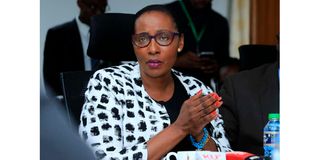Show up when media calls, political aspirants advised

Gender Chief Administrative Secretary Beatrice Elachi. She says she is a product of the media and has challenged aspirants to build confidence and trust with the media.
What you need to know:
- Stakeholders have appealed to female political aspirants to use the media to articulate their agenda when given a chance.
- Most aspirants say they lack the skills to package themselves for the media, and because of poor visibility, they face stereotyping and their voices are not being heard.
- Nation Media Group Executive Editor Pamela Sittoni, appealed to them to embrace training on how to engage the media including digital.
Women’s participation in political leadership remains low despite increased awareness on the importance of engaging them in governance as stipulated in the New Constitution of Kenya (2010).
Among the challenges women aspiring to join politics face include misrepresentation by the media, lack of finance, sexual and gender-based violence, low media literacy and inadequate media relations skills.
Journalists for Human Rights (JHR) Project Manager for the Voice for Women and Girls project in Kenya, Sammy Muraya, has appealed to female political aspirants to use the media to articulate their agenda when given a chance.
He spoke during a meeting on how to enhance women’s participation in political leadership ahead of the 2022 general election, organised by JHR at a Nairobi hotel. The round-table also discussed ways to enhance relations between the media and female political aspirants.
Women's representation
The meeting that brought together editors, civil society organisations and women political actors, deliberated on the disparity in women’s representation in the media and strategies to engender the electoral process, and increase women’s voices.
Mr Muraya said many women leaders are unavailable whenever media approaches them for interviews, compared to their male counterparts who are easier to get.
“It is also a high time female aspirants and leaders involve men in their political journey. Just tag those powerful men to your side. Identify the men you can work with to realise your agenda,” Mr Muraya said.
Most aspirants in the meeting said they lack the skills to package themselves for the media, and because of poor visibility in the media, they face stereotyping and their voices are not being heard.
Nation Media Group (NMG) Executive Editor Pamela Sittoni, speaking at the event, observed that media leadership should make it possible for women to get more coverage.
Embrace training
She challenged women leaders to seize any opportunity and appear in talk shows and interviews when called upon, and appealed to them to also embrace training on how to engage the media including digital.
“Women leaders need to build and nurture relationships with the media and be involved in national conversations, including writing opinion articles,” Ms Sittoni said.
She encouraged the leaders to be strategic and work with female journalists.
“We also need to rectify the gender bias in newsrooms and reporting. The top leadership in the media must drive that change and make decisions to balance the scale by ensuring gender parity in all their platforms, including in editorial leadership,” she said.
She applauded NMG for implementing changes that promote women’s leadership in the newsroom, which saw her appointed the first female managing editor of Daily Nation in 2019, while 13 other women were promoted to editors.
Rangwe MP
Ms Sittoni told the gathering that NMG has set the pace in gender balance reporting by setting up a gender desk, which among others, is tasked with gender mainstreaming, ensuring gender diversity in the newsroom and training and mentoring of young women journalists.
Rangwe MP Dr Lilian Gogo told the aspirants to make the media their friend as it will help them become visible.
“The media has built me and it can also do the same to you. Do not fear the media as it will make you go places. Get as many media contacts as possible,” she said.
Gender Chief Administrative Secretary Beatrice Elachi, said she is a product of the media and challenged the aspirants to build confidence and trust with the media.
“If you have a relationship with the media, they will definitely not bring you down. When the media wants a story, do not run away from them,” she said.
President of the Editors Guild who is also NMG’s Digital Managing Editor Churchill Otieno, advised the aspirants to be available and ensure journalists can get their views quickly when needed.
“It is also important for women leaders to engage in topical debates and ensure their views reach the people. You need to also ensure your messages are unique and well packaged for the journalist or editor to use” he said.
He challenged women leaders to embrace technology and use it to create and deliver messages relevant to their campaign strategies. Mr Otieno told the gathering that editors have no preferred candidates in the upcoming election.
“Our role is to provide a platform for those vying to articulate their agenda and enable the electorate to compare them and their manifestos, and see who is most likely to best serve them,” he said.





